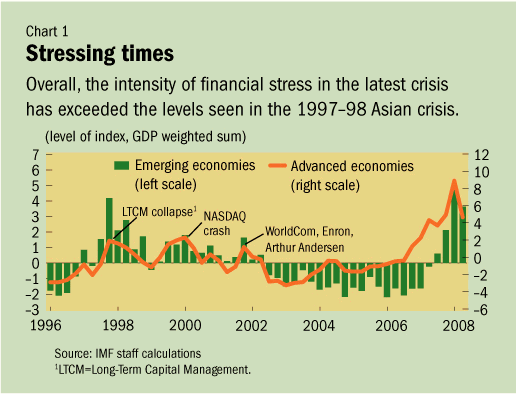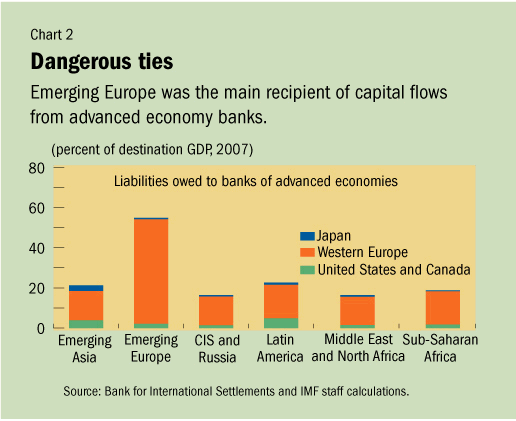
Typical street scene in Santa Ana, El Salvador. (Photo: iStock)
IMF Survey: Rapid Spread of Crisis Reflects Close Global Economic Ties
April 16, 2009
- IMF research shows financial stress can spread rapidly to emerging economies
- Financial links with advanced economies are a key channel
- Coordinated policy response by advanced, emerging economies needed
Emerging economies are now so closely integrated with advanced economies that financial stress transmits rapidly and forcefully, with financial linkages a key channel of transmission, according to new IMF research.

Cosmetics factory in Bucharest, Romania: global financial crisis is having virulent impact on various emerging European economies (photo: Mihai Barbu/Reuters)
WORLD ECONOMIC OUTLOOK
But the decline in capital flows to emerging economies following a crisis may be protracted, given the solvency problems faced by banks in the major industrialized economies that provide significant financing to emerging markets.
Chapter 4 of the April 2009 World Economic Outlook (WEO), entitled “How Linkages Fuel the Fire: The Transmission of Financial Stress from Advanced to Emerging Economies,” studies how financial stress is transmitted from advanced to emerging economies. New WEO economic forecasts are scheduled for release April 22.
The chapter presents a new financial stress index for emerging economies, building on a similar index introduced in the October 2008 World Economic Outlook for advanced economies. The new index measures the intensity of stress in different parts of the financial sector (equity markets, exchange markets, and the banking sector) and will be available for 18 emerging economies on a monthly basis since 1997. The index will be made available on the IMF website after the IMF Spring Meetings.
How large is financial stress?
The current financial crisis in advanced economies is unique in its depth, breadth, and impact. It has rapidly engulfed all parts of the global financial system (banks, securities, and exchange markets) and has already lasted longer than any systemic stress episode since the 1980s.
By the end of 2008 virtually all advanced economies were experiencing financial stress at crisis levels. As a result, financial stress in emerging economies also reached unprecedented levels. It spread quickly to all major emerging regions and multiplied through all parts of the financial sector. On average, the intensity of stress surpassed levels seen during the Asian crisis (see Chart 1).

How does stress get transmitted?
According to our research, stress in emerging economies moves almost one-for-one with stress in advanced economies. The transmission is rapid and occurs within one or two months after advanced economies experience financial stress. But there is significant cross-country variation in the transmission. Empirical analysis shows that the pass-through of stress is stronger in emerging economies with closer financial linkages (that is, banking, portfolio, and foreign direct investment) with advanced economies.
During the most recent crisis, bank lending linkages appear to have been the main driver of stress transmission. Western European banks have dominated bank lending flows to emerging economies since the mid-1990s. By end-2007, their assets in emerging economies reached 10 percent of advanced-economy GDP, compared to a combined 2.5 percent of GDP for Canadian, Japanese, and U.S. banks.
Emerging Europe stands out as the main recipient of bank lending flows. Foreign claims in terms of destination GDP are the highest among emerging regions (see Chart 2). The intensity of these links helps explain why the global financial crisis, which is centered on banks, has such a virulent impact on various emerging European countries.

What is the impact on capital flows?
Not all systemic financial crises in advanced economies have led to protracted reductions in capital flows to emerging economies. But historical evidence suggests that a quick recovery may not be the most likely scenario this time around. The key role played by banks in the current crisis presages a drawn-out decline in capital flows to emerging economies.
Evidence from past episodes of systemic banking stress in advanced economies (the Latin American debt crisis of the early 1980s and the Japanese banking crisis of the 1990s) shows that the decline in capital flows tends to be sizeable and long lasting. Since then, banking globalization has continued and risks of large scale de-leveraging associated with common lender effects have risen. Given their large share of external financing through banks, a number of emerging European economies might be heavily affected by a drought of capital inflows.
What can policymakers do?
The shock to financial systems in advanced and emerging economies is too large to be dealt with on an individual basis. Strengthening current account and fiscal balances can help emerging economies during periods of global financial calm. However, during a major global financial shock reducing country vulnerabilities alone cannot insulate emerging economies from the transmission of stress.
Instead, a coordinated policy response by advanced and emerging economies is required to prevent further escalation and spreading of financial stress. Such a response needs to involve many elements, including access to external funding for emerging economies via official channels, support for advanced economy banks with large presence in emerging economies, and coordination between home and host country financial supervisors.
While achieving financial stability should be the immediate goal, policymakers ultimately need to work toward strengthening multilateral insurance systems: this would allow emerging economies to reap the benefits of international integration while limiting the potential risks from greater external financial integration.
The commitments to expand the IMF’s resources and the Fund’s new Flexible Credit Line and reformed conditionality framework should be helpful in this context.
Comments on this article should be sent to imfsurvey@imf.org


